Redditor Calls Out Germaphobe GF For Being A Hypocrite And Making Him Wash Hands Whenever He Touches Her Dog While Letting It Sleep In Their Bed At The Same Time
Hygiene is an essential aspect of pet ownership, as it not only helps to keep pets healthy and happy, but it also prevents the spread of diseases and parasites. Pets, especially dogs and cats, are known to carry germs and bacteria on their fur and paws, which can be easily transferred to their owners and other people.
Today, we have a story about hygiene. OP had a disagreement with his significant other (28F) regarding hand-washing habits. Last night, his SO woke him up at 3 AM to tell him that he had thrown their dog off the bed while sleeping.
When OP went to the kitchen to grab a glass of water and use the restroom, his SO asked him to wash his hands. After some back and forth, OP decided to sleep in the guest room instead of their bed.
The next morning, OP woke up in a bad mood and asked his SO for an apology for waking him up in the middle of the night. However, his SO told him that it was his fault for not washing his hands and that he was overreacting.
This resulted in an argument, and OP expressed his frustration with his SO's behavior. OP acknowledges that he should have washed his hands after using the restroom, but he was annoyed that his SO wouldn't drop the issue.
He also mentioned that he tends to get angry quickly when sleep-deprived. Now, they are at a standstill, with OP feeling like he needs an apology and his SO feeling like he is being dramatic.
OP asks:

OP had a disagreement with his significant other (28F) about hand-washing habits. Last night, his SO woke him up at 3 AM to tell him that he had thrown their dog off the bed while sleeping.
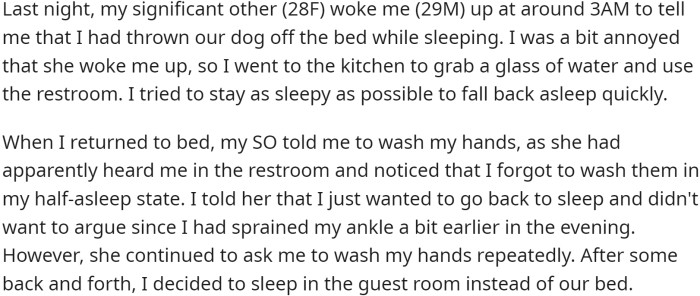
When OP went to the kitchen to grab a glass of water and use the restroom, his SO asked him to wash his hands. After some back and forth, OP decided to sleep in the guest room instead of their bed.
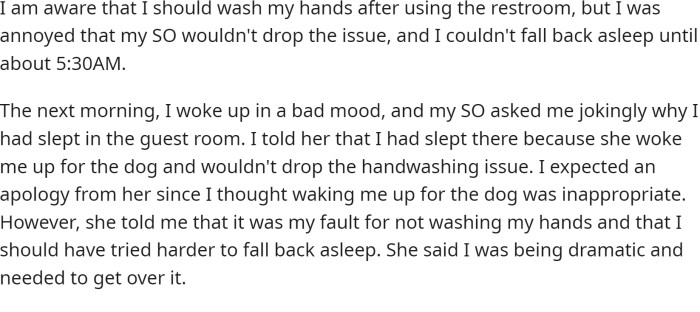
Understanding Hypocrisy in Relationships
The situation described reflects a common theme in relationships where double standards can create significant friction. According to Dr. Alexandra Solomon, a relationship therapist, "Hypocrisy in relationships often stems from unacknowledged fears and conflicting values, which can lead to misunderstandings." In this case, the girlfriend's insistence on handwashing while allowing the dog to sleep in bed may signal an internal conflict regarding her beliefs about cleanliness and affection.
This disconnect can be particularly challenging in relationships, as it raises questions about consistency and trust. When one partner enforces strict rules while engaging in contradictory behaviors, it can lead to feelings of confusion and frustration in the other partner, as noted by Dr. Sue Johnson, a pioneer in couples therapy, who states, "Inconsistent behavior can erode trust and create emotional distance."
Understanding Germaphobia
Dr. Alice Green, a psychologist specializing in anxiety disorders, indicates that germaphobia can often stem from underlying anxiety issues.
Individuals with this condition may exhibit compulsive cleaning or hygiene behaviors as a coping mechanism to manage their fears.
Research suggests that these behaviors, although protective in nature, can sometimes lead to conflicts in relationships when one partner's needs clash with the other's.
The next morning, OP woke up in a bad mood and asked his SO for an apology for waking him up in the middle of the night. However, his SO told him that it was his fault for not washing his hands and that he was overreacting.
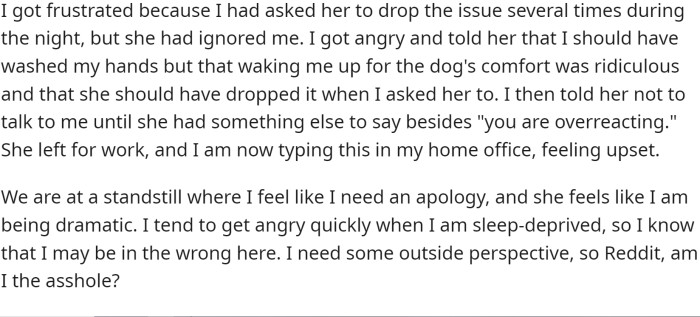
OP has offered the following explanation for why they think they might be the a-hole:

Concerned about germs, and she lets the dog sleep on the bed?
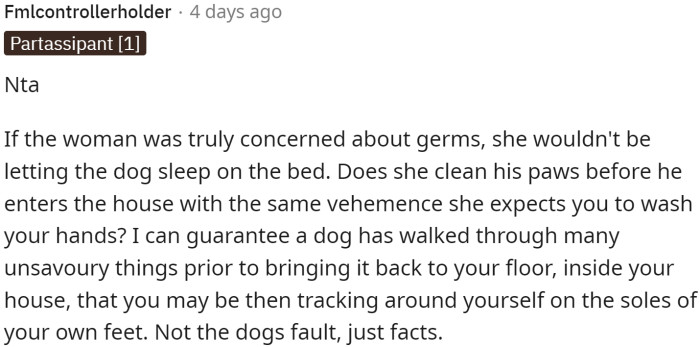
From a psychological perspective, this reflects a classic case of cognitive dissonance, where individuals experience discomfort when their beliefs do not align with their actions. This theory, developed by psychologist Leon Festinger, suggests that individuals are motivated to reduce this dissonance, which can manifest in various ways, such as rationalization or denial. The girlfriend’s behavior may indicate her struggle to reconcile her germaphobic tendencies with her affection for her dog.
Addressing these inconsistencies through open dialogue can be beneficial. Encouraging a discussion about each other's values regarding hygiene and pet ownership might foster greater understanding and reduce tension.
This situation raises questions about the inconsistency in behavior—what appears to be hypocrisy can often be a reflection of complex coping strategies.
Studies indicate that individuals may not always recognize their own contradictory behaviors, especially when stress levels are high, leading to confusion in relationships.
Understanding this can create a more compassionate perspective towards the partner's actions.
No matter how much we love them, we have to admit that dogs are dirty
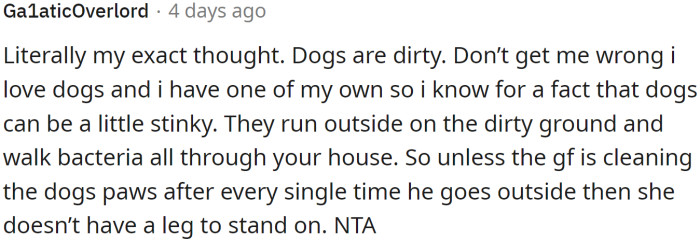
This Redditor has a different opinion:
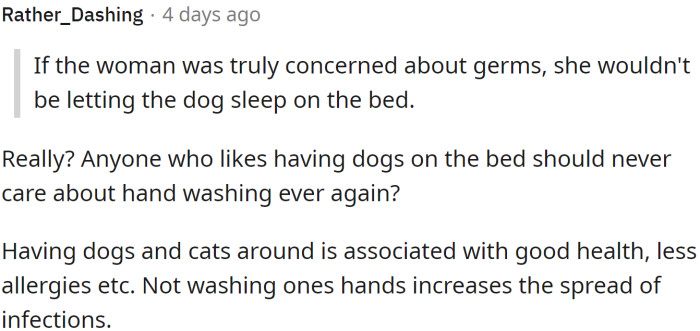
A microbiologist says:
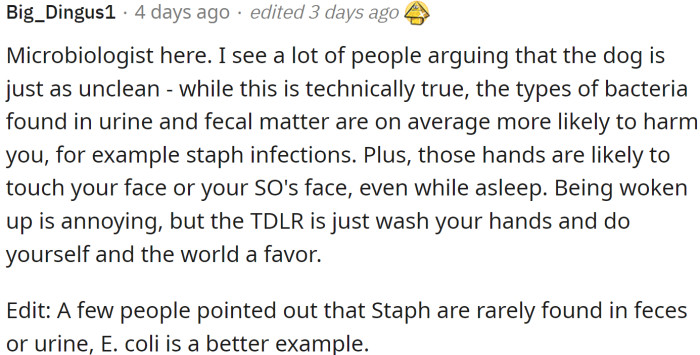
Navigating Values in Relationships
In relationships, navigating differing values and beliefs about hygiene and health can be complex. A study in the Journal of Abnormal Psychology emphasizes that couples who engage in discussions about their values tend to have stronger, more resilient relationships. By openly sharing their perspectives, partners can work towards finding common ground, which can enhance their emotional connection and understanding.
In this case, the Redditor might consider approaching the topic with empathy, expressing understanding for his girlfriend's concerns while also sharing his feelings about the perceived hypocrisy. This could create space for a constructive conversation about their differing perspectives on hygiene and pet care.
The Role of Open Communication
To address these tensions, fostering open communication is essential.
Dr. Kevin Smith, an expert in relationship dynamics, highlights that discussing feelings and needs openly can clarify misunderstandings.
For instance, expressing discomfort with hygiene rules while also acknowledging the partner's fears can help bridge the gap between differing perspectives.
This Redditor believes that OP should learn to stand his ground.
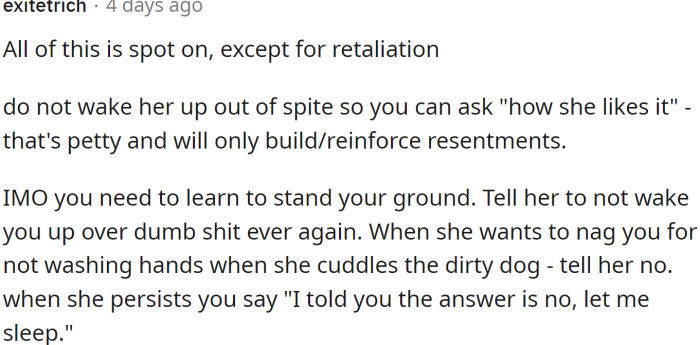
The bottom line is - everyone is wrong here

OP's situation highlights the importance of effective communication and understanding each other's perspectives in relationships. It is possible that both parties may have valid points, and it is essential to find a solution that works for both of them.
What do you think?
Research supports that couples who engage in open discussions about their needs are more likely to find workable solutions to conflicts.
By normalizing these conversations, partners can cultivate a deeper understanding of each other’s experiences and create a more supportive dynamic.
Establishing a routine check-in about personal boundaries and comfort levels can also be beneficial.
Finding Compromise in Relationships
Compromise plays a crucial role in navigating relationship conflicts, especially in situations involving differing hygiene preferences.
Dr. Patricia Williams, a relationship psychologist, notes that finding middle ground can alleviate tension and foster cooperation.
For example, agreeing on specific hygiene practices while allowing for flexibility can create a more harmonious living situation.
Research indicates that successful compromises often involve both partners feeling heard and respected.
Taking turns in decision-making can enhance the sense of partnership and reduce feelings of resentment, ultimately strengthening the relationship.
By valuing each other's perspectives, couples can build a healthier foundation for their relationship.
Psychological Analysis
This situation highlights the complexity of individual preferences and how they can conflict within relationships.
Establishing clear communication and finding ways to honor each partner’s needs is essential for maintaining a healthy dynamic.
Analysis generated by AI
Analysis & Alternative Approaches
Navigating relationship dynamics involving differing hygiene preferences requires empathy, communication, and compromise.
Research shows that fostering open dialogue can lead to more harmonious living situations.
Ultimately, understanding each other's fears and preferences can significantly enhance relationship satisfaction.
Additionally, it may be helpful for both partners to reflect on their emotional responses to these behaviors. Understanding why certain behaviors trigger discomfort can lead to greater self-awareness and empathy. Engaging in mindfulness practices can help each partner clarify their feelings and articulate them more effectively during discussions.
Ultimately, fostering an environment of open communication and mutual respect is key to addressing these issues. By prioritizing understanding over defensiveness, both partners can work towards creating a more harmonious relationship.
Analysis & Alternative Approaches
In summary, addressing hypocrisy in relationships requires open communication and a willingness to understand differing values. Research supports the idea that discussing personal beliefs can enhance emotional connection and reduce tensions. By fostering a dialogue that prioritizes empathy and mutual understanding, partners can navigate these challenges more effectively.



